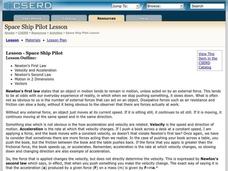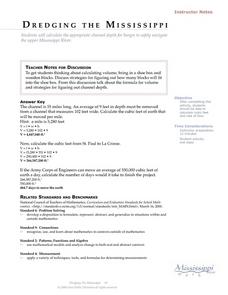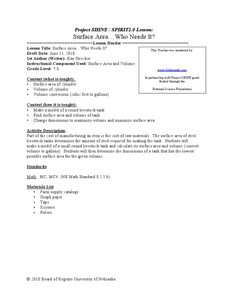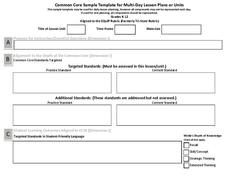Curated OER
Developing a Theory About the Nature of the Contents of a Sealed Box
Students observe the changes of a closed chemical system. They record and analyze the data as they manipulate the system. They answer questions to end the lesson.
Curated OER
Space Ship Pilot
Young scholars visualize the relation between acceleration and velocity in 2 dimensions. They are introduced to Newton's first law,and Newton's second law. Students work on an exploration activity where they condsider an example of a...
Curated OER
A Functional Housing Market
Students access the Internet to search for housing prices in Houston, Texas,(the location can be changed to accommodate any location) and compare the prices to the number of square feet found in the living area of a house.
Curated OER
Impact on Your Essence
Students are introduced to the use of symbolism and how it can change one's view of a piece of art. Using a piece of art, they view it as if they were the artist and create a symbol that accompanies it. They discuss the impact of two-...
Curated OER
The Trig to Soccer
Young scholars analyze angles applied to a penalty kick in a soccer game. Based on dimensions of the goal, and the penalty area, students determine where the better chance of scoring lies.
Curated OER
Dredging the Mississippi
Students determine the amount of earth that needs to be removed from the Mississippi and the amount of time it takes the Army Corps of Engineers to complete a dredging project. Given specific dimensions of a channel, calculations are...
Curated OER
Water Locked
Students calculate cubic feet of water and rate of flow, given the formulas for volume, rate of flow and specific dimensions. Students use symbolic forms to represent and analyze mathematical situations and structures. Students use...
Curated OER
Two for One Box Company
Here is a challenging and thought-provoking math worksheet. In it, learners work together to construct a variety of boxes of different sizes to see if doubling the size of a box really means it can hold twice as much stuff as the...
Curated OER
Surface Area, Who Needs it?
In this geometry lesson plan on cylinders, geometers explore how to find the smallest surface area for a given volume. They use their knowledge to relate it to the real world by making a model of a livestock tank.
Curated OER
Cylinder: Student Worksheet
Pairs of geometry whizzes work together to determine which of three differently shaped cylinders will have the greatest volume. Pupils cut out the three rectangles embedded in the plan, and tape them together to form a cylinder. From...
Curated OER
Geometry and Shapes
High schoolers discuss and identify polygons and lines. In this geometry lesson, learners review liner, square and cubic units so they can incorporate it into the lesson on measurement and creating packing that are cost effective.
Curated OER
Size of Atoms - Trends
This compendious collection of slides leaves no questions when it comes to the concept of atomic size. Thorough and easy-to-read graphs, tables, and graphics explain atomic radii, the shielding effect, the octet rule, isoelectric...
Curated OER
Math Handbook: Trigonometry
You'll be spinning in unit circles once you read through this jumbo-sized resource of everything you need to know about trigonometry. Each page has color-coded examples with explicit directions that detail the problems and formulas.
Physics Classroom
Law Enforcement - Refraction
Pupils apply their knowledge of refraction to four different sets of challenges. Each of the first three focus on one variable's impact on the direction of bending. The fourth combines variables for greater challenge.
Physics Classroom
The L.O.S.T. Art of Image Description - Converging Lenses
Magnifying glasses and cameras often use converging lenses, but how do they alter an image? Pupils discover a lens, axis, and object arrow before identifying four characteristics of the resulting image. They label the location,...
Physics Classroom
Total Internal Reflection
Scholars work through three different activities applying their knowledge of total internal reflection (TIR). First, they simply identify which diagrams create TIR and which don't. Next, they match different types of boundary behaviors...
Physics Classroom
Spectrum
Scholars relate each of the colors in the spectrum, except indigo, by comparing their frequencies, wavelengths, and energy levels. Then, they compare each section of the electromagnetic spectrum when considering the same three variables.
Physics Classroom
If This, Then That: Color
The dress color debate of 2015 taught the importance of understanding how we see light. Scholars view a shirt under two different colored lights and then must predict what color the shirt will appear under a third light. They apply color...
Physics Classroom
Color Pigments
Objects contain pigments that selectively absorb a wavelength of light, and our eyes only observe a very small range of these wavelengths. Scholars apply these two facts to three different activities. They identify the pigment in an...
Physics Classroom
Law of Reflection
Reflection seems simple to understand, but without a complete understanding, pupils struggle with ray diagrams, specular versus diffuse reflection, total internal reflection, and image formation. An engaging interactive provides three...
Physics Classroom
Who Can See Who?
While only briefly mentioned in most Physics books, plane mirrors and their applications offer the basics necessary for future studies. While working through an interactive, pupils demonstrate knowledge of both reflection and its forms....
Classrooms in Action
Common Core Sample Template for Multi-Day Lesson Plans or Units
Make sure you've covered all your bases when designing a Common Core unit. From essential questions and standards alignment to instructional supports and reflections, this template will guide you toward completing a comprehensive,...
National Council of Teachers of Mathematics
Scale Factor
Does doubling mean everything doubles? Learners adjust the scale factor between two rectangles. Using the calculated measurements, pupils investigate the ratios between the lengths, perimeters, and areas of the rectangles.
Curated OER
Inquiry Unit: Modeling Maximums and Minimums
Young mathematicians explore the maximun area for patio with the added complexity of finding the mimimum cost for construction. First, they maximize the area of a yard given a limited amount of fence and plot width v. area on a scatter...
Other popular searches
- Changing Dimensions Area
- Changing Dimensions Volume
- Changing Dimensions Math
- Changing Dimensions Prisms
- Changing Dimensions 3 D

























